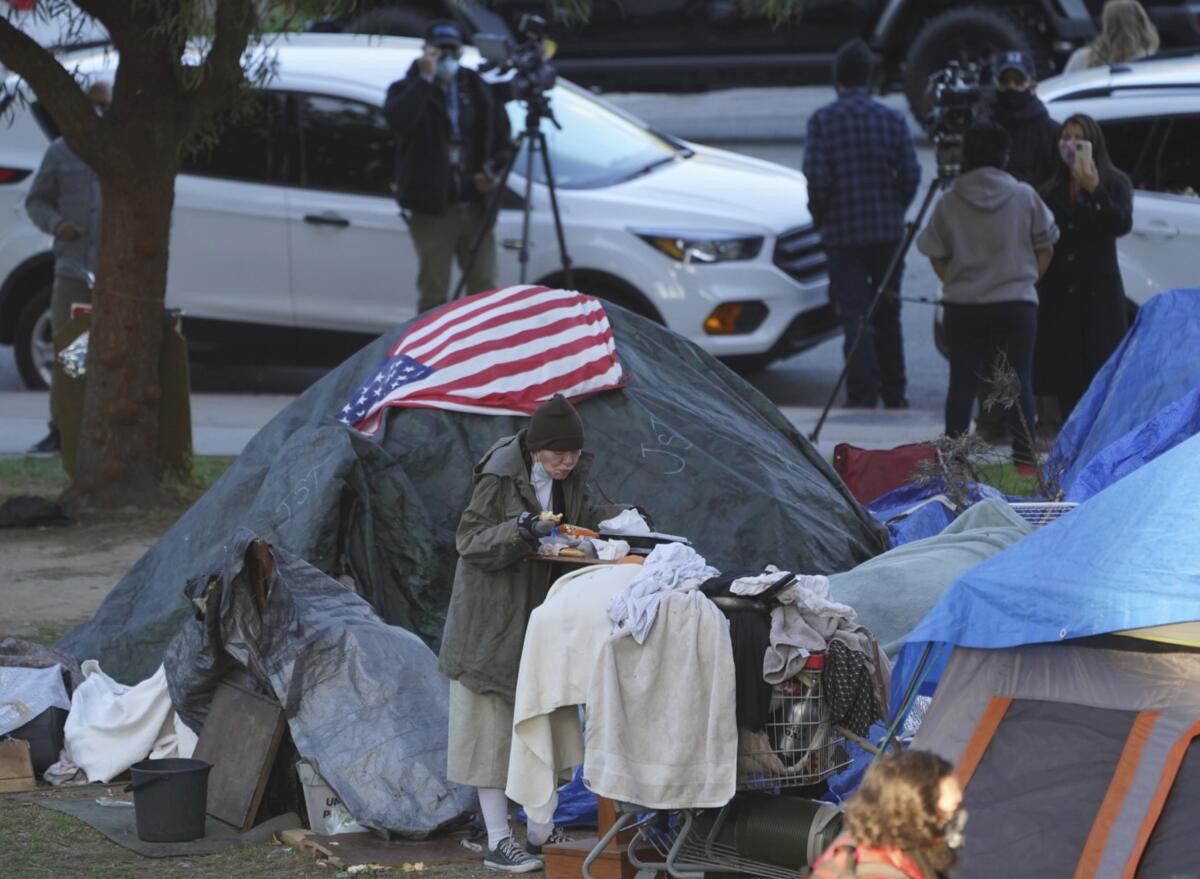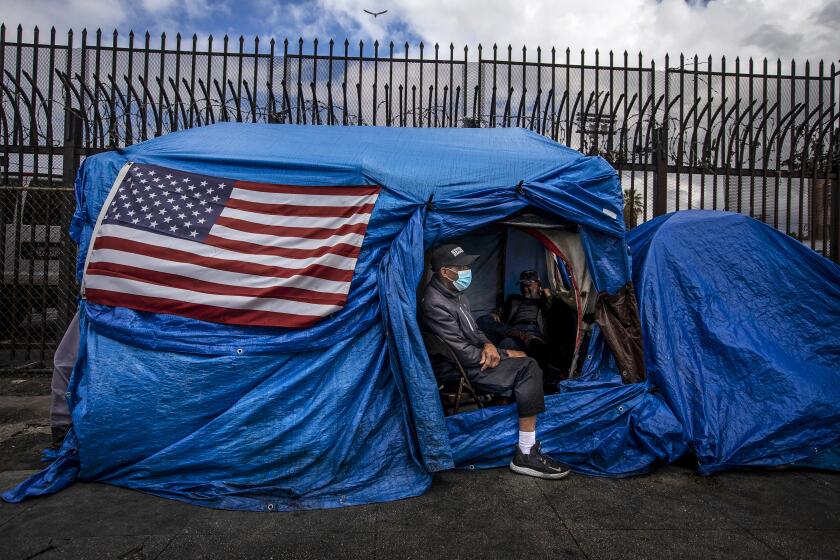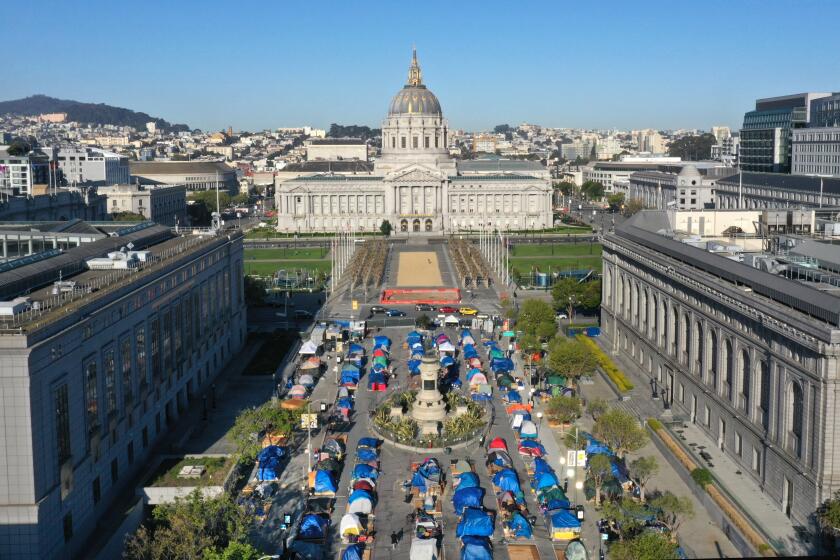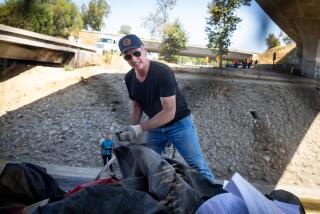Gov. Newsom proposes $12 billion to house California’s homeless

SAN DIEGO — In what was lauded as the single biggest investment any state has ever made to address homelessness, Gov. Gavin Newsom on Tuesday announced a $12-billion proposal to create affordable housing, increase mental health services and fund other programs to get people off the street.
Newsom made the announcement at the Kearny Vista Apartments, one of two former San Diego hotels that were purchased and converted into housing with funding from the state’s Project Homekey program introduced by the governor last year.
“What we’re announcing here today is truly historic,” Newsom said. “It’s unprecedented, not just in California history. What we’re announcing here today is simply unprecedented in American history.”
While admitting to sounding almost hyperbolic, Newsom said his description was factual, as the proposal was many times greater than any state had committed to addressing homelessness.
His appearance in San Diego came a day after the state announced a projected $75.7-billion budget surplus, and Newsom proposed sending $600 stimulus checks to middle-income residents.
If approved by legislators as part of the state budget, Newsom said his plan would provide housing for 65,000 people and stabilize housing for more than 300,000 people who have difficulty paying rent or are facing other housing challenges.
The mayor’s proposed budget, set for release Tuesday, comes at a moment of heightened frustration over the city’s handling of homelessness.
It also would provide at least 28,000 new beds and housing placements for people with behavioral health issues and seniors facing a high risk of becoming homeless.
San Diego County has the fifth-largest homeless population in the country, with the latest count from January 2020 finding 7,658 people in shelters or sleeping outside. The city funds three large shelters, but a count conducted by Downtown San Diego Partnership in April found 873 people still were sleeping on sidewalks or in cars on downtown streets.
The city and county have had shelters and homeless services for years, but local efforts significantly stepped up after the homeless population was hit hard by a hepatitis outbreak in 2017 that left 40 people dead and 600 hospitalized.
Hundreds of people have been sheltered or placed in permanent housing since then, and elected officials routinely say solving homelessness is their top priority.
The problem has not subsided. Homeless encampments continue to be spotted across the county, and the Regional Task Force on the Homeless recently released a report that found the number of people who were newly homeless jumped from 2,326 in 2019 to 4,152 in 2020.
Cities throughout the county have attempted to address the issue. El Cajon, which has the second-highest homeless population in the county, spent $1.5 million to help fund nine programs last year. Carlsbad recently adopted a voucher program to provide temporary shelter to homeless people, and Oceanside already has used vouchers to places dozens of people in hotel rooms after clearing two encampments.
Sanctioned tent camps sprouted up in San Francisco at the beginning of the COVID pandemic and have become key to the city’s homelessness response.
Newsom’s $12-billion proposal includes $7 billion for additional property purchases through the state’s Project Homekey program. Besides the Kearny Mesa property, the program helped fund the purchase of a Mission Valley extended-stay hotel, which together provide housing for 387 formerly homeless people.
Newsom said last year’s $1-billion Project Homekey program created 6,000 permanent units throughout the state while a related program, Project Roomkey, provided temporary shelter to 36,000 people.
The government’s proposal also includes $150 million to stabilize and rehouse Project Roomkey clients, $1.75 billion to build affordable homes and $447 million to address student homelessness in the University of California, Cal State University and California Community College systems.
The plan sets a five-year goal of ending family homelessness through several investments, including $1.85 billion for new housing, $1.6 billion for rental assistance and homeless prevention, and $40 million in grants to local governments.
More than $50 million also would be available in grants for local governments to help homeless people move out of encampments and into safe, more stable housing.
In a related program, Newsom is proposing a $1.5-billion investment to transform public spaces and clean spaces near highways, creating about 15,000 jobs that would include work for homeless people, at-risk youths, veterans and people reentering the workplace from incarceration.
Although the proposals are a substantial increase in funding to homeless programs, some critics say it is not enough.
On Tuesday, state Assemblyman Miguel Santiago (D-Los Angeles) said in a statement that the $12-billion proposal was “a big step in the right direction,” but he would continue to push for a $20-billion five-year “Budget of Opportunity” proposed by Assembly Democrats.
Former San Diego Mayor Kevin Faulconer, who supports a recall of Newsom and hopes to be on the ballot as his replacement, issued a statement critical of the governor.
“Homelessness has skyrocketed by 10,000 people since Gavin Newsom took office,” said Faulconer, who was mayor when the city acquired the two extend-stay hotels through Newsom’s Project Homekey program. “No amount of money will solve this crisis without a leader who has the political will to buck the status quo and take bold actions to get people off the streets and indoors to receive the help they need.”
Newsom said accountability would be a significant part of his proposal, with measurements, targets and goals set for any funded program.
Joining the governor at the news conference were San Diego Mayor Todd Gloria, County Board of Supervisors Chair Nathan Fletcher and Father Joe’s Villages President and CEO Deacon Jim Vargas.
Also making an impromptu appearance with the governor was Lindsey Prescott and her daughter Mia Grace, two of the 170 residents of Kearny Vista Apartments. Prescott said she had been homeless and an addict before the birth of her daughter, who was briefly placed in foster care.
“Because of this opportunity, I got my daughter back,” Prescott said about moving into the apartment. She said she has been sober for 18 months.
Vargas said the proposal to expand funding for more affordable housing units was welcome news in San Diego. Father Joe’s Villages last year converted an aging South Bay hotel into Benson’s Place, permanent housing for formerly homeless people, and is constructing the 14-story Saint Teresa of Calcutta Villa in downtown San Diego to provide about 400 more affordable units.
“There has never been a more critical time to move people off the streets and into safe, permanent housing,” Vargas said. “The inability to afford housing is one of the key drivers of homelessness and results in tens of thousands of our neighbors being forced to live on the streets to survive.”
Fletcher credited the governor for his past efforts to help homeless people but said the number of people still on the street is a reminder of work yet to be done.
“The governor’s announcement today is truly a game-changer,” Fletcher said. “A historic investment from the state of California that can functionally end the state of family homelessness.”
Fletcher vowed that the county would work with the state in helping fund housing projects and programs. The county recently created an Office of Homeless Solutions, and Fletcher said the board is prepared to commit $85 million in the new budget to help match the state’s commitment.
Gloria said the state’s budget surplus has created an unprecedented opportunity to take actions that can make major impacts for years to come. He and other mayors for large California cities recently called upon the governor to commit more money to address homelessness.
“This announcement will make a world of difference in the lives of thousands of Californians up and down the state,” Gloria said.
More to Read
Sign up for Essential California
The most important California stories and recommendations in your inbox every morning.
You may occasionally receive promotional content from the Los Angeles Times.













